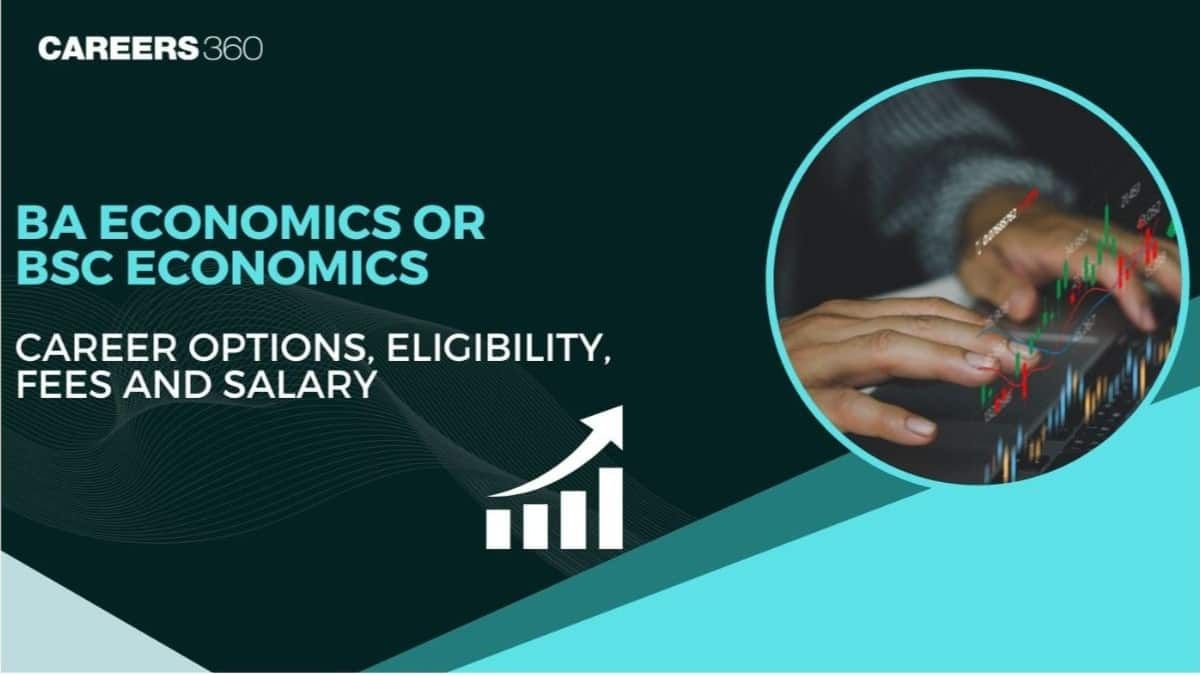UPES B.Sc Admissions 2025
Ranked #46 amongst Universities in India by NIRF | 1900+ Students Placed | 94% Placement | 633+ Recruiters | Last Date to Apply: 28th April
Choosing between a BA in Economics and a BSc in Economics can be a challenging task for students. While the major focus of both degrees is on economics, they differ in approach, curriculum, career prospects and scope. In this article, we will talk about the key differences, eligibility, salary, fees, and career options.

BA Economics is a degree programme of three years duration. It focuses on theoretical, qualitative, and social aspects of economics. The course aims to provide fundamental knowledge of economics along with humanities subjects.
We have discussed the career options, eligibility, fees and salary of BA Economics. For further details, students can check the official website of the provider.
Ranked #46 amongst Universities in India by NIRF | 1900+ Students Placed | 94% Placement | 633+ Recruiters | Last Date to Apply: 28th April
Apply for Integrated M.Sc Biotechnology (5 Years, after 10+2) @ VIT Bhopal University | H-CTC 52 LPA
Bachelor of Science in Economics, abbreviated as BSc Economics is another popular undergraduate degree programme. Unlike BA Economics, it combines economics with science-related subjects. Course duration is three years, spread across six semesters.
Listed below are the career options, eligibility, fees, and salary available after graduating with a BSc in Economics. However, students are advised to check the official website of the provider for further information.
Both BA and BSc Economics offer promising career paths. However, the choice between the two depends on the candidate. For candidates interested in theoretical understanding, BA Economics may be a better choice. Those interested in gaining technical knowledge of economics can choose BSc Economics.
Hello Luqmaan,
yes, you can write the KCET exam again even after joining B.Sc. biotechnology. KCET allows candidates to appear multiple timess as long as they meet the eligibility criteria. just ensure you fulfill age and subject requirements for the course you're aiming for.
Hope this message finds you well,
Thank You.
Hi aspirant,
Yes, the B.Sc. B.Ed. integrated course is offered at RSD College . According to official sources, this program spans four years and has a total of 50 available seats for students.
For further information regarding RSD College, including details about the fee structure and placement opportunities, visit here.
I hope this information proves helpful to you!
Hi aspirant,
Yes, the B.Sc. B.Ed. integrated course is offered at RSD College . According to official sources, this program spans four years and has a total of 50 available seats for students.
For further information regarding RSD College, including details about the fee structure and placement opportunities, visit here .
I hope this information proves helpful to you!
Hi aspirant,
Here are various ways you can gain admission without taking the CUET :
1 . Private Colleges : Many renowned private colleges in India offer B.Sc. Zoology is based on their criteria.
2 . State Universities : Many state universities and their affiliated colleges do not require the CUET for admission.
3. Merit-Based Admissions : You can also apply to colleges based on your marks from the 12th standard.
I have compiled a list of top colleges in India for B.Sc. Zoology, filtered based on their fees and placement records. You can check here .
Hii There,
The three-year undergraduate BSc Psychology program is offered. It examines how people behave in relation to different physiological systems. In India, BSc Psychology is offered by more than 220 colleges. Nineteen are government and 202 are private. In India, a psychologist typically makes Rs. 3.7 LPA.
For more information, please visit:
https://www.careers360.com/courses/bsc-in-psychology
I hope this answers your question.
Thanks
Ranked amongst top 3% universities globally (QS Rankings)
B.Sc (Hons) Admissions 2025 Now Open | Ranked Among the Top 100 Universities in the World by QS World University Rankings 2025 | Last Date: 28th Apr'25
Ranked #1 Among all Private Indian Universities in QS Asia Rankings 2025 | Scholarships worth 210 CR
#10 in India by NIRF Ranking | Institution of Eminence by Govt. of India | Scholarships Available
NBA Accredited | AICTE Approved | Use Code: Careers360 & Avail 50% Off on Application Forms | Last Date: 19th Apr’25
100+ Industry collaborations | 10+ Years of legacy